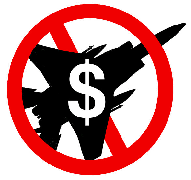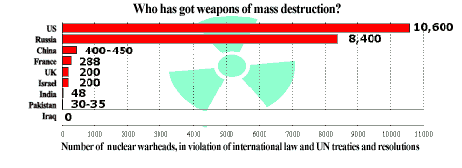"NO BLOOD ON OUR MONEY!" Read the Boycott War campaign platform Visit the Boycott War Design Gallery Alternatives to War-based Economics and Bloodstained Corporations Take the BOYCOTT WAR! Power Quiz ®
BOYCOTT WAR Just as the US-led occupation has ravaged Iraq, huge corporations are ravaging countries - buying up their water supplies, gas and energy companies, health care systems and much more. Modern economic policies are another front in the same war.
|
|
THE BOYCOTT WAR FAQ
What is the goal of the boycott? Many boycott campaigns have a very specific and immediate goal (i.e. to get a certain company or country to abandon a certain policy). The goal of the Boycott War Campaign is multi-fold. They are 1) To help spread awareness about how involved certain companies are with the war industry and war-mongering politicians; 2) To help mobilize people and organizations into a positive economic force for long-term social change; and 3) To make it less profitable and less popular for companies to get involved with the military industry.
Have such boycotts had any effect? Yes. A survey from the Seattle based Global Market Insite (GMI) Inc. questioning 8,000 consumers in eight countries between December 10 12, 2004. The survey finds that the Bush administration`s foreign policies may be costing U.S. corporations business overseas as twenty percent of respondents in Europe and Canada said they consciously avoided buying U.S. products as a protest against the White House policies. That finding was consistent with similar polls conducted out by GMI three weeks after Bush`s November election victory and another survey by UK-based NOP World in July 2004. [Source: Boycott Bush network newsupdate 3 Feb. 2005 www.motherearth.org]
Who is engaged in the boycott movement? It is believed that millions of people across the world are boycotting US brands since the invasion and occupation of Iraq. Ms. Waratah Rosemarie Gillespie, the Pacific coordinator for the Boycott Bush campaign, states that social movements from over 50 countries have now joined the boycott campaign network. From Vermont to Finland to Japan there are vibrant boycott campaings being waged. From members of the European Parliament to US church groups to Arundathi Roy, people of all walks of life have endorsed the boycotting of the US and companies profitting from war.
What's the difference between Boycott Bush and Boycott War campaign? The difference is minimal. Both are designed to oppose militarism and the companies, countries, and politicians that finance and support militarism. That commonality is also the ultimate focus for both campaigns. Probably the only real distinction between them is that Boycott Bush campaigns necessarily become out-dated when Bush is no longer in office while Boycott War campaigns can continue as long as militarism continues. Whether or not the Boycott Bush campaigns change name and continue after Bush leaves office or not remains to be seen.
Don't boycotts hurt the wrong people (i.e. the workers)? Quite the contrary. If a boycott movement shifts consumer habits toward Fair Trade and other alternatives then workers (albeit different workers than those in the targeted country or company) are actually benefitting. Furthermore, workers in the targeted companies can take action as well and protest the fact that their labor is being used to hurt other workers in other countries through militarism. Even if a boycott were to hurt some workers over others, its damage could hardly be compared to the anti-working class devastation that is wrought by war.
Why do anti-war boycotts often target the USA and Israel? Precisely because they are two of the most militarized countries in the world and both of them are using that military leverage to exert their political will on militarily weaker groups with bloody and disastrous consequences. This entails both the brutal disregard for civilian lives as well as global security and stability in general. And as if that wasn't enough: The combined military might of China, North Korea, Cuba, Iran, Syria, Sudan, Libya, and Vietnam is far less than that of the United States and it is the United States -not any of those countries- who has engaged in recent military operations across the world (Sudan, Afghanistan, Somalia, Serbia, Albania, Panama, Libya, Yemen, Grenada, and Iraq) not to even mention the millions of civilians killed by the US military operations in Cambodia, Laos, and Vietnam less than 40 years ago. Israel holds the outstanding position of having broken more UN Security Council resolutions than any other country (even to the point of obtaining nuclear weapons and jailing the man who leaked the information about it). The UN General Assebmbly routinely condemns Israel's human rights abuses and treatment of Palestinians. The US, on the other hand, ranks number one in UN Security Council vetoes - applying far more vetoes since 1970 than the rest of the "big five" combined (China, France, Russia, and the UK).
If you have any more questions that you feel ought to be answered here, please send them to: boycottwar@hotmail.com
|

